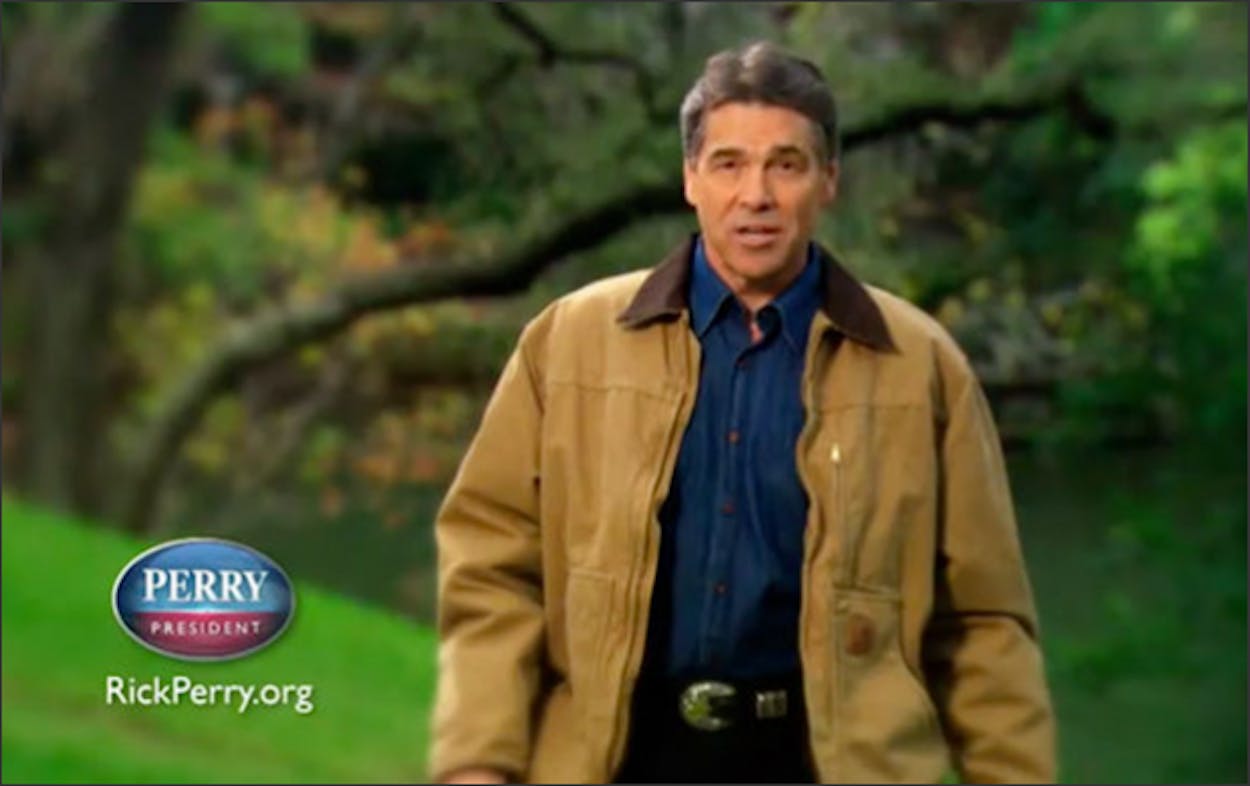The anti-gay overtone of Rick Perry’s “Strong” ad kept GIF-makers, humorists, and bloggers busy on Thursday when the ad exploded as an Internet meme. Within 48 hours of the video’s release, there was: an assortment of parody videos; a Tumblr titled “Rick Perry’s Unpopular Opinions;” the discovery that the governor’s jacket greatly resembles the one worn by Heath Ledger in Brokeback Mountain; a brief bit on the Colbert Report; and such comic Photoshops as this:

(Photo Illustration by The Frogman)
The Texas Tribune rounded up the highlights, as did the Perry Presidential blog, which also noted in another post that Perry’s latest YouTube ad, about “Obamacare,” disabled the “Like” and “Dislike” option after “Strong” outperformed the much-scorned teenaged pop singers Justin Bieber and Rebecca Black in the latter category (close to 400,000 “dislikes” as of early Friday morning).
As Sam Stein of the Huffington Post first reported, the ad was not without controversy among Perry’s own campaign staff. “When the ad was being crafted several weeks ago,” Stein wrote, “Perry’s top pollster, Tony Fabrizio, called it ‘nuts,’ according to an email sent from Fabrizio to the ad’s main creator, longtime GOP operative Nelson Warfield.”
According to Richard Oppel Jr. of the New York Times, a Perry aide “chalked it up to the ‘occasionally salty’ and robust interchanges between advisers.”
But Fabrizo’s position drew heavy fire from Jimmy LaSalvia, co-founder and executive director of the gay conservative group GOProud. “It is the height of hypocrisy for Tony Fabrizio to have been a part of that,” LaSalvia told Stein. “He has lined his pockets for years with money from the gay community to conduct polls to ostensibly help gay people in this country.” (LaSalvia tweeted some harsher words on Wednesday.)
In any case, Perry’s aides told Oppel the ad was not intended to be anti-gay, but instead is an “effort to tap into the sentiment that led Iowa voters to remove three Supreme Court justices one year ago after they voted to legalize same-sex marriage.” However, Oppel suggests that constituency voters, i.e. evangelical voters, is more concerned about the economy this year.
“Beating up on gays to score political points is no longer a safe bet, even for Republicans, most of who would rather their prospective presidents talk about fixing the economy,” Jason Stanford, a Perry biographer (Adios, Mofo) and Democratic consultant, wrote on his blog Behind Frenemy Lines.
But the former Chris Bell campaign manager hasn’t counted his old rival out just yet.
If 15% of Iowa Republicans want to hear about religious values, then Perry wants every one of them.
This is Perry’s last stand. Getting half of all evangelical voters translates to 30% at the Iowa caucuses, and in this fractured field that could be enough for first place. Finishing in second or third means he has risen from the dead and can make at least as far as Florida. Finishing fourth, where he currently is in the polls, means it’s over for Perry.
- More About:
- Politics & Policy







